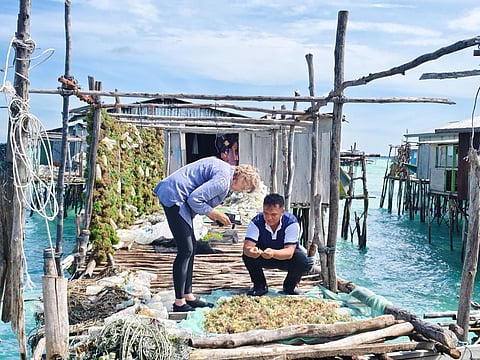

Prof. Juliet Brodie of the Natural History Museum, London meets with Malaysian seaweed farmers.
Photo: SAMS / GlobalSeaweed-PROTECT.
Scientists from Malaysia and the UK have launched a new initiative aimed at protecting seaweed farming from the growing impacts of climate change.
At a recent 2.5-day workshop in Sabah, Malaysia, more than 50 stakeholders joined researchers and officials from the Department of Fisheries Sabah to discuss a new framework intended to provide a practical roadmap for improving the resilience of Malaysia’s seaweed industry, the "Progressive Management Pathway for Improving Biosecurity in the Seaweed Industry" (PMP/AB-Seaweed).
Seaweed is a vital part of marine ecosystems and supports the livelihoods of an estimated six million farmers in 56 countries. However, according to researchers, the sector faces mounting challenges from climate change, particularly pest and disease outbreaks linked to warming seas.
The Sabah meeting focused on Malaysia’s main cultivated seaweed species, the threats they face, and potential solutions, including the development of climate-resilient cultivars. Discussions also explored opportunities to commercialise other seaweed species and to protect wild stocks, which scientists say will be critical for long-term resilience.
The Progressive Managament Pathway team led by the GlobalSeaweed-PROTECT programme.
Photo: SAMS / GlobalSeaweed-PROTECT.
The workshop forms part of GlobalSeaweed-PROTECT, a three-year programme (2025–2028) funded by the UKRI Biotechnology and Biological Sciences Research Council (BBSRC) under the Sustainable and Resilient Aquaculture Systems in Southeast Asia initiative. Its goal is to strengthen the seaweed industry across the region by improving climate resilience, biosecurity, and the protection of wild seaweed diversity, while supporting farming communities.
“Seaweeds are vital for the functioning of the marine ecosystem and there are more than six million seaweed farmers who rely on seaweed for their livelihoods. Yet, commercial seaweeds are threatened by outbreaks of pests and diseases, as a result of climate-induced increases in seawater temperatures, which is limiting an already fragile production in a very competitive global market," said Project lead, Professor Juliet Brodie of the Natural History Museum, London, via a press release.
"It is hoped that the PMP/AB-Seaweed will provide a practical road map to help the seaweed industry in Malaysia increase its resilience to climate change," Brodie stated.
The project involves an international team including Professor Phaik Eem Lim of the University of Malaya, Professor Elizabeth Cottier-Cook of the Scottish Association for Marine Science (SAMS), the Department of Fisheries Sabah, and the UN University Comparative Regional Integration Studies.
Cottier-Cook said the trip to Malaysia allowed the UK and Malaysian teams to establish links with local stakeholders and co-design the new pathway. “Our shared knowledge in seaweed cultivation, biosecurity and governance between Malaysia and the UK will bring the necessary experience required to really make a difference to this industry,” she added.
Lim described the meeting as “a significant milestone and the first step towards delivering climate solutions for the seaweed farmers by working in partnership with organisations across Malaysia to develop a system that can enhance climate resilience and improve livelihoods.”
